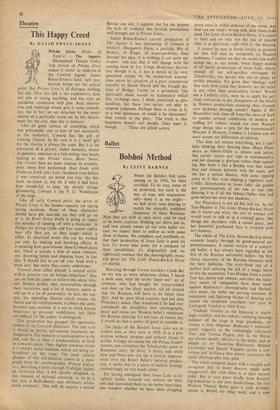Theatre
This Happy Creed
By DAVID PRYCE-JONES Private Lives. (Duke of York's.) — The Square.
(Hampstead Theatre Club.)
THE revival of Private Lives makes it easier to understaid
the Coward legend. James Roose-Evans's hard, tight pro-
" duction brings out the central point, that Private Lives is all dialogue, nothing
but talk. Now this talk is not explanatory, does not aim at saying anything, and has only an incidental connection with plot. Real observa- tion and reportage would give it some immedi- acy, but in fact we are detached by the smart chatter of a particular social set. In this detach- ment lies the clue, that this is mimicry.
Like all good mimics of something which was presumably real to him (if not necessarily
to the audience), Coward has the gift of creating illusion. In his case it is a small gift for the illusion is always the same. But it is the relevation of a private, rather fantastic, dream of glamour, romance in a rich setting, true hearts beating as one. Private Lives, Bitter Sweet, The Vortex bore no more relation to actuality, even when first performed, than Nude with Violin or Look after Lulu. Outdated even before it was conceived, no world was ever like this (sssh, we know it), but oh, if only it had been, how wonderful to keep the distant mirage glimmering. Coward is the P. G. Wodehouse of the stage.
Like all early Coward plays, the pivot of Private Lives is the human capacity for taking wrong decisions. None of these characters should have got married, yet they still go on at it. In Bitter Sweet Dolly is going to repeat the mistake of running off with a musician: in Design for Living Gilda and Leo cannot realise how silly they are, so they laugh—which is sillier. In theatrical terms this can be worked put only by making and breaking affairs. It is amazing how quarrelsome these Coward plays are. There is usually a hint of salon violence, too, throwing lamps and slapping faces. A line like, '1 should like to cut off your head with a meat axe,' has more than comic undertones.
Coward once called himself 'a natural writer with a constant eye on human behaviour.' One can see how he comes to believe this about him- self. Mimics project their personalities through their imitations, and a lot of mimicry seems to add up to a lot of personality. In fact, the fan- tasy, the appealing illusion which creates the charm and the entertainment, is always the same, hermetic and enclosed. It is not so much human behaviour as personal wishfulness, but these are difficult for the author to distinguish.
This production has grasped the egomaniac centres of the Coward characters. The cast is as it should be, brittle, self-centred, hopelessly un- imaginative. For mimicry is unimaginative in the end, and this is what is fundamentally at fault in Coward's plays. Their highest common factor is Coward's social fantasies, which are being ex- ternalised on the stage. The most concise glimpse of this self-delusion comes in a para- graph from his autobiography, Present Indica- tive, describing a drive through Trafalgar Square on Armistice Day. 'I felt ignobly delighted, in this moment of national rejoicing, to be in a tail coat, a Rolls-Royce, and obviously aristo- cratic company.' This will all acquire a period flavour one day, I suppose, but for the present the lack of credulity has farcical possibilities well brought out in Private Lives.
James Roose-Evans's current production of The Square is less interesting. If Coward is mimicry, Marguerite Duras is pastiche. Bits of Beckett, of Pinget, of avant-gardisme, float through her play. lt is nothing if not quite up- to-date: you feel that it will change with the coming issue of Les Temps Modernes. Deriva- tive though it is, it has a mood of its own, generated mainly by the round-eyed assump- tions about his situation as a poor commercial traveller by David March and the fraught dis- tress of Bridget Turner as a governess. The platitudes about escape or acceptance which they exchange were, I think, conceived as pro- fundities, but these two actors are able to suspend judgment. Perhaps there is irony in it, or a real ignorance, or could it be cleverness? One returns to the play: `The truth is that happiness doesn't suit people. They want it, though. . . .' These are gifted actors.


































 Previous page
Previous page